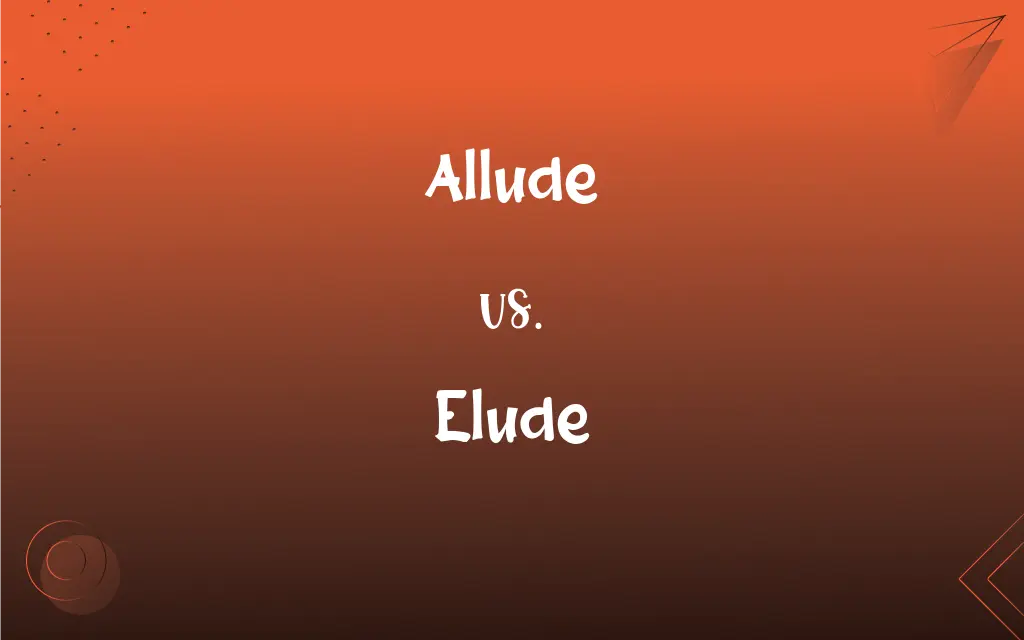Allude vs. Elude: What's the Difference?
Edited by Aimie Carlson || By Janet White || Published on March 2, 2024
Allude means to indirectly refer to something, while elude means to avoid or escape from something or someone, often by cunning means.

Key Differences
Allude is a verb that means to suggest or call attention to indirectly; to hint at. When someone alludes to something, they mention it in an oblique or tangential way without stating it explicitly. This can be used in literature, speech, and various forms of communication to refer to something without directly naming it, often for stylistic reasons, subtlety, or to avoid direct reference for sensitivity reasons. Elude, on the other hand, refers to the act of avoiding or escaping from someone or something, especially by using cunning or skill. It implies a successful avoidance of a problem, danger, or pursuit. This can apply to physical escape, such as a criminal eluding the police, or abstract concepts, such as an idea that eludes one’s understanding.
Allude is often used in contexts where indirect reference is made to literature, historical events, or cultural items, while elude is used in contexts requiring evasion or avoidance. For example, a speaker might allude to a famous quote without saying it outright, whereas a suspect might elude capture by cleverly disguising their whereabouts.
Both allude and elude highlight a relationship between the subject and object; however, the nature of this relationship is fundamentally different. Alluding to something involves a mental or intellectual connection, often requiring knowledge or insight to understand the reference. Eluding involves a physical or conceptual separation, where the object or understanding remains out of reach despite attempts to grasp it.
The distinction between allude and elude is essential for clear communication, especially in writing and speech, where the precision of language can greatly affect the clarity and effectiveness of the message conveyed. Misusing these words can lead to confusion about whether someone is making an indirect reference or speaking about avoidance.
Comparison Chart
Definition
To indirectly refer to something
To avoid or escape from
ADVERTISEMENT
Context of Use
Literary and conversational reference
Avoidance or escape scenarios
Connotation
Intellectual or suggestive
Cunning or evasive
Example Usage
Mentioning something indirectly
Dodging or escaping something or someone
Related Concepts
Hinting, implying, suggesting
Avoiding, escaping, evading
Allude and Elude Definitions
Allude
To suggest something without saying it directly.
The artist's work alludes to various personal struggles.
ADVERTISEMENT
Elude
To escape from or avoid a pursuer.
The thief eluded the police for months.
Allude
To make an indirect reference.
She alluded to the fact that they might get married.
Elude
To avoid or escape by speed, cleverness, or trickery.
The answer eludes me, despite my efforts to understand.
Allude
To refer to something obliquely.
In his speech, he alluded to his opponent's lack of experience.
Elude
To fail to be grasped or remembered by someone.
The specifics of the conversation eluded her.
Allude
To hint at something subtly.
The novel alludes to historical events without naming them.
Elude
To evade or escape understanding, perception, or appreciation.
The significance of the message eludes most readers.
Allude
To evoke or call to mind something indirectly.
The imagery in the poem alludes to ancient myths.
Elude
To slip away from or evade detection or capture.
The spy eluded capture by changing his appearance.
Allude
To make an indirect reference
The candidate alluded to the recent war by saying, "We've all made sacrifices.".
Elude
To evade or escape from, as by daring, cleverness, or skill
The suspect eluded the police.
Allude
(intransitive) To refer to something indirectly or by suggestion.
Elude
To escape the memory or understanding of
A name that eludes me.
A point that eluded the audience.
Allude
To refer to something indirectly or by suggestion; to have reference to a subject not specifically and plainly mentioned; - followed by to; as, the story alludes to a recent transaction.
These speeches . . . do seem to allude unto such ministerial garments as were then in use.
Allude
To compare allusively; to refer (something) as applicable.
Allude
Make a more or less disguised reference to;
He alluded to the problem but did not mention it
FAQs
What does elude mean?
To avoid or escape from by cunning, skill, or resourcefulness.
Can you allude to a person?
Yes, by indirectly referring to them or their known traits.
What does it mean to allude to something?
To indirectly mention or hint at something.
Is alluding always intentional?
Typically, yes, as it involves making a deliberate indirect reference.
How can something elude someone?
By being difficult to understand, remember, or capture.
How is alluding used in literature?
To enrich text by referring to other works or symbols.
What might a writer allude to in a text?
Other texts, historical events, cultural phenomena.
Can ideas elude?
Yes, ideas can elude grasp or comprehension.
What's the difference between alluding and quoting?
Alluding implies indirect reference; quoting involves direct citation.
Can one allude to something accidentally?
While alluding is usually intentional, unintended references can occur.
Can emotions elude description?
Yes, when they are difficult to express or define clearly.
How can one effectively use allusion in writing?
By subtly referencing well-known works or themes to add layers of meaning.
Why is it important to understand what eludes us?
To overcome challenges in learning or problem-solving.
Is it possible for success to elude someone?
Yes, if despite efforts, the desired outcome remains out of reach.
Can technology elude understanding for some?
Yes, especially when it advances rapidly and requires new knowledge.
In what context might a criminal elude the police?
By hiding, using disguises, or moving frequently.
Why do poets often allude to classical mythology?
To add depth and universal significance to their works.
What strategies can help capture what eludes us?
Research, persistence, and creative thinking.
How do magicians use elusion?
By employing tricks and distractions to evade detection.
How does one's understanding elude others?
Through complexity or subtlety that others find hard to grasp.
About Author
Written by
Janet WhiteJanet White has been an esteemed writer and blogger for Difference Wiki. Holding a Master's degree in Science and Medical Journalism from the prestigious Boston University, she has consistently demonstrated her expertise and passion for her field. When she's not immersed in her work, Janet relishes her time exercising, delving into a good book, and cherishing moments with friends and family.
Edited by
Aimie CarlsonAimie Carlson, holding a master's degree in English literature, is a fervent English language enthusiast. She lends her writing talents to Difference Wiki, a prominent website that specializes in comparisons, offering readers insightful analyses that both captivate and inform.







































































